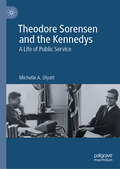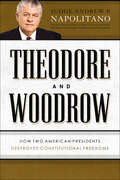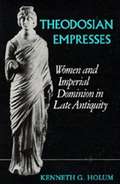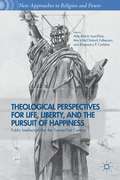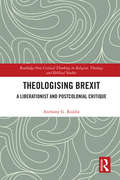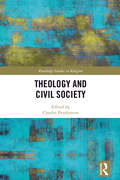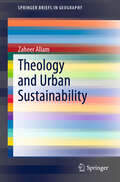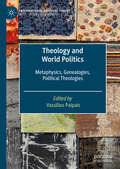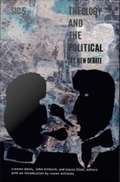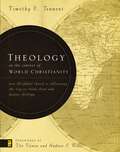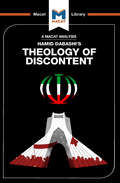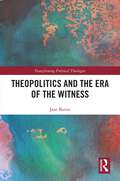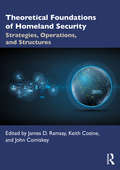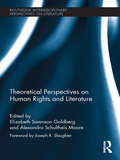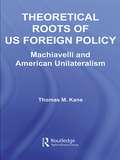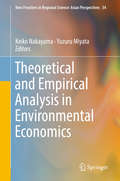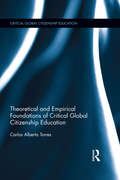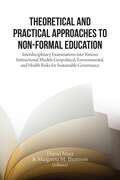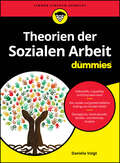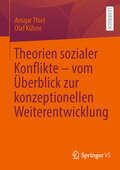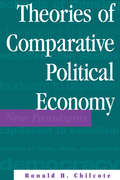- Table View
- List View
Theodore Sorensen and the Kennedys: A Life of Public Service
by Michelle A. UlyattOf the hundreds of books written about John F. Kennedy, none have yet taken the full measure of the role that Theodore Sorensen played in shaping his presidency. Serving as President Kennedy’s speechwriter from 1952 until 1963, Sorensen was a key advisor in the White House and a gatekeeper of the Kennedy legacy in the years after his assassination. This book presents a compelling portrait of Sorensen’s life and place in the American political landscape. He became an outspoken critic of corruption in politics, a vocal opponent of the militarist foreign policy approach that successive administrations adopted, and an advisor to Democratic presidential candidates such as Robert F. Kennedy and Barack Obama. Taking up questions about the role of presidential advisors and the concept of public service, an ideal that was central to the most famous of the speeches that Sorensen wrote for President Kennedy, Michelle A. Ulyatt offers new insight into Sorensen’s influence on the Kennedy years and the generation of leaders who came after.
Theodore and Woodrow: How Two American Presidents Destroyed Constitutional Freedom
by Andrew P. NapolitanoThe New York Times–bestselling author and Fox News judicial analyst examines the effects of two US presidents on personal freedom.“Either the Constitution means what it says, or it doesn’t.”America’s founding fathers saw freedom as a part of our nature to be protected—not to be usurped by the federal government—and so enshrined separation of powers and guarantees of freedom in the Constitution and the Bill of Rights. But a little over a hundred years after America’s founding, those God-given rights were laid siege by two presidents caring more about the advancement of progressive, redistributionist ideology than the principles on which America was founded.Theodore and Woodrow is Judge Andrew P. Napolitano’s shocking historical account of how a Republican and a Democratic president oversaw the greatest shift in power in American history, from a land built on the belief that authority should be left to the individuals and the states to a bloated, far-reaching federal bureaucracy, continuing to grow and consume power each day.With lessons rooted in history, Judge Napolitano shows the intellectually arrogant, anti-personal freedom, even racist progressive philosophy driving these men to poison the American system of government. And Americans still pay for their legacy—in the federal income, in state-prescribed compulsory education, in the Federal Reserve, in perpetual wars, and in the constant encroachment of a government that coddles special interests and discourages true competition in the marketplace.With his attention to detail, deep constitutional knowledge, and unwavering adherence to truth telling, Judge Napolitano moves through the history of these men and their times in office to show how American values and the Constitution were sadly set aside, leaving personal freedom as a shadow of its former self, in the grip of an insidious, Nanny state, progressive ideology.
Theodore the Great: Conservative Crusader
by Daniel RuddyTheodore Roosevelt has a complicated legacy. To some, he was the quintessential American patriot and hero, a valiant soldier who won the Congressional Medal of Honor. Others remember him as a cultural icon, the man who brandished a "big Stick," proclaimed the "Square Deal," led a "Strenuous Life," and inspired the "Teddy Bear." He was a farsighted conservationist who essentially founded the modern environmental movement. He was also a legendary hunter. Mark Twain once called him "insane." <P><P>So who was the real Teddy Roosevelt? <P><P>Daniel Ruddy’s new biography cuts through the impenetrable tangle of misconceptions and contradictions that have grown up over the last century and obscured our view of a man who remains perhaps the most controversial president in U.S. history. Avoiding the sins of hero worship and character assassination, Ruddy gives the public what is long overdue—a fair-minded and even-handed assessment of a misunderstood American icon.
Theodosian Empresses: Women and Imperial Dominion in Late Antiquity
by Kenneth G. HolumTheodosian Empresses sets a series of compelling women on the stage of history and offers new insights into the eastern court in the fifth century.
Theodosius II
by Christopher KellyTheodosius II (AD 408-450) was the longest reigning Roman emperor. Ever since Edward Gibbon, he has been dismissed as mediocre and ineffectual. Yet Theodosius ruled an empire which retained its integrity while the West was broken up by barbarian invasions. This book explores Theodosius' challenges and successes. Ten essays by leading scholars of late antiquity provide important new insights into the court at Constantinople, the literary and cultural vitality of the reign, and the presentation of imperial piety and power. Much attention has been directed towards the changes promoted by Constantine at the beginning of the fourth century; much less to their crystallisation under Theodosius II. This volume explores the working out of new conceptions of the Roman Empire - its history, its rulers and its God. A substantial introduction offers a new framework for thinking afresh about the long transition from the classical world to Byzantium.
Theological Perspectives For Life, Liberty, And The Pursuit Of Happiness
by Ada María Isasi-díaz Mary Mcclintock Fulkerson Rosemary P. CarbineRather than wield religion as a weapon or a ruse in irrational appeals, the book attempts to reimagine a shared American mythos and ethos, by reminding us of our shared stake in creating an America committed to the life of all peoples and species and to the full developments of our capabilities as an exercise of liberty.
Theological-Political Treatise
by Michael Silverthorne Benedict De Spinoza Jonathan IsraelSpinoza's Theological-Political Treatise (1670) is one of the most important philosophical works of the early modern period. In it Spinoza discusses at length the historical circumstances of the composition and transmission of the Bible, demonstrating the fallibility of both its authors and its interpreters. He argues that free enquiry is not only consistent with the security and prosperity of a state but actually essential to them, and that such freedom flourishes best in a democratic and republican state in which individuals are left free while religious organizations are subordinated to the secular power. His Treatise has profoundly influenced the subsequent history of political thought, Enlightenment 'clandestine' or radical philosophy, Bible hermeneutics, and textual criticism more generally. It is presented here in a new translation of great clarity and accuracy by Michael Silverthorne and Jonathan Israel, with a substantial historical and philosophical introduction by Jonathan Israel.
Theologising Brexit: A Liberationist and Postcolonial Critique (Routledge New Critical Thinking in Religion, Theology and Biblical Studies)
by Anthony G. ReddieThis book offers a comprehensive analysis of the theological challenge presented by the new post-Brexit epoch. The referendum vote for Britain to leave the European Union has led to a seismic shift in the ways in which parts of the British population view and judge their compatriots. The subsequent rise in the reported number of racially motivated incidents and the climate of vilification and negativity directed at anyone not viewed as ‘authentically’ British should be a matter of concern for all people. The book is comprised of a series of essays that address varying aspects of what it means to be British and the ways in which churches in Britain and the Christian faith could and should respond to a rising tide of White English nationalism. It is a provocative challenge to the all too often tolerated xenophobia, as well as the paucity of response from many church leaders in the UK. This critique is offered via the means of a prophetic, postcolonial model of Black theology that challenges the incipient sense of White entitlement and parochial ‘nativism’ that pervaded much of the referendum debate. The essays in this book challenge the church and wider society to ensure justice and equity for all, not just a privileged sense of entitlement for some. It will be of keen interest to any scholar of Black, political and liberation theology as well as those involved in cultural studies from a postcolonial perspective.
Theology and Civil Society (Routledge Studies in Religion)
by Charles PembertonFrom food banks to migrant welcome committees, and community organisers to internet based campaigners, civil society is central to the North Atlantic social landscape. Theology and Civil Society advances our understanding of what civil society is and offers a theologically informed re-imagining of our shared social life. Prefaced by a foreword by the Rev. Dr Rowan Williams, this book explores contemporary manifestations of the kind of collective action observed in civil society since the 1800s. It then examines civil society as the sum of modern associations which mediate our relationships to the market and the state, but which cannot be identified fully with either the market or the state. Finally, three different perspectives on civil society are presented using insights from theologians such as John Milbank and Georg Hegel. This is a pertinent topic for contemporary society, and it is explored expertly here by an international panel of contributors. As such, it is an important volume for any scholar of Theology and Religious Studies and their interactions with Sociology and Politics.
Theology and Urban Sustainability (SpringerBriefs in Geography)
by Zaheer AllamEven though theology does provide interesting and important contributions to ethics that laid the foundation of our modern societies, this book looks at exploring how theology has impacted on urban morphology and has led to questionable unsustainable practices which impacts on both climate and societal living standards. This is seen as being accelerated with the impacts of climate change coupled with increasing urbanisation rates that stresses on contemporary notions and foundations, as initially sparked by religion. Through an argumentative style, the author sets forth to explore the ethics of religious dogmas in a rapidly urbanising world that is stressed by increasing consumption from a booming demographic.
Theology and World Politics: Metaphysics, Genealogies, Political Theologies (International Political Theory)
by Vassilios PaipaisSituated within the wider post-secular turn in politics and international relations, this volume focuses not on religion per se, but rather explicitly on theology. Contributions to this collection highlight the political theological foundations of international theory and world politics, recasting theology and politics as symbiotic discourses with all the risks, promises and open questions this relation may involve. The overarching claim the book makes is that all politics has theology embedded in it, both in the genealogical sense of carrying ineradicable traces of rival theological traditions, and also in the more ontological sense of being enacted by alternative configurations of the theologico-political. The book is unique in bringing together a diverse group of scholars, spanning knowledge areas as varied as IR, political theory, philosophy, theology, and history to investigate the complex interconnections between theology and world politics. It will be of interest to students and scholars of political theory, international relations, intellectual history, and political theology.
Theology and the Political: The New Debate
by John Milbank Creston Davis Slavoj I EkThe essays in Theology and the Political--written by some of the world's foremost theologians, philosophers, and literary critics--analyze the ethics and consequences of human action. They explore the spiritual dimensions of ontology, considering the relationship between ontology and the political in light of the thought of figures ranging from Plato to Marx, Levinas to Derrida, and Augustine to Lacan. Together, the contributors challenge the belief that meaningful action is simply the successful assertion of will, that politics is ultimately reducible to "might makes right. " From a variety of perspectives, they suggest that grounding human action and politics in materialist critique offers revolutionary possibilities that transcend the nihilism inherent in both contemporary liberal democratic theory and neoconservative ideology. Contributors. Anthony Baker, Daniel M. Bell Jr. , Phillip Blond, Simon Critchley, Conor Cunningham, Creston Davis, William Desmond, Hent de Vries, Terry Eagleton, Rocco Gangle, Philip Goodchild, Karl Hefty, Eleanor Kaufman, Tom McCarthy, John Milbank, Antonio Negri, Catherine Pickstock, Patrick Aaron Riches, Mary-Jane Rubenstein, Regina Mara Schwartz, Kenneth Surin, Graham Ward, Rowan Williams, Slavoj Zizek
Theology in the context of World Christianity: How the Global Church Is Influencing the Way We Think about and Discuss Theology
by Timothy C. TennentAs Christianity advances in the South and East, its universal truths face new questions and are expressed in new ways. Majority world theological reflection needs to be brought into conversation with Western theology. Doing so will uncover blind spots and biases and will bring a potentially revitalizing agent into the Western church.
Theology of Discontent: The Ideological Foundation of the Islamic Revolution in Iran
by Bryan Gibson Magdalena C. DelgadoHamid Dabashi’s 1997 work Theology of Discontent reveals a creative thinker capable not only of understanding how an argument is built, but also of redefining old issues in new ways. The Iranian Revolution of 1978–9 was front-page news in the West, and in some ways remains so today. Though it was an uprising against authoritarian royal rule, with a coalition of modernisers and Islamists, the revolution saw the birth of a new Islamic Republic that seemed to reject pro-Western democracy. Dabashi wanted to analyze the real reasons for this change, while examining how Islamic ideologies contributed to the revolution and the republic that followed. Theology of Discontent examines different Islamic thinkers, analyzing how views with seemingly little in common contributed to the modern Iranian belief system. Beyond its insightful analytical dissection of these eight thinkers, Theology of Discontent also shows Dabashi’s creative thinking skills. Reframing the debates about Iran’s relationship with the West, he traced the ways in which Iranian identity formed in reactive opposition to Western ideas. In many ways, Dabashi suggested, Iran was trapped in a cycle of deliberately asserting its difference from the West, a process that was fundamental to the development of its own unique brand of revolutionary Islamism.
Theopolitics and the Era of the Witness (Transforming Political Theologies)
by Jane BarterTheopolitics and the Era of the Witness focuses on witnessing in the aftermath of political atrocity or genocide. It offers a diachronic study of the relationship between theological forms of witnessing within Jewish and Christian traditions and public forms of witnessing in the twentieth and twenty-first centuries. This book explores the ways in which various witnesses to political atrocity and their mediators tacitly drew on religious themes of salvation to make sense of their suffering. It investigates survivor testimony and the use made of it through scholarly interpretations of testimony within the Hebrew Bible, New Testament, and theological and philosophical traditions within Judaism and Christianity. The chapters move from a consideration of the early post-Shoah writings of Paul Celan and Primo Levi through to a discussion of the Truth and Reconciliation Commissions of South Africa and Canada. The author makes the case for a "weak messianism" or remnant witnessing as an antidote to overdetermined and politicized uses made of survivor testimonies. This book makes a valuable contribution to the work of theopolitics, which claims that theology, despite its persistent misuse, can serve a constructive and critical force within public life, albeit in a chastened key.
Theoretical Foundations of Homeland Security: Strategies, Operations, and Structures
by James D. Ramsay Keith Cozine John ComiskeyThis new textbook outlines the main theories and concepts from a variety of disciplines that support homeland security operations, structures and strategies. Following the terrorist attacks of September 11th, "homeland security" (HLS) grew in importance within the U.S. government (and around the world) and matured from a concept discussed among a relatively small cadre of policymakers and strategic thinkers to a broadly discussed issue in Congress and society with a growing academic presence. Yet the ability to discern a theory of homeland security that would support overall security strategy has been more elusive to both scholars and policymakers. This textbook aims to elucidate a grand theory of homeland security by leveraging the theoretical underpinnings of the disciplines that comprise the strategies, operations and structures of the HLS enterprise. In this way, each chapter contributes to a grand theory of homeland security as it explores a different discipline that influences or supports a domain of the homeland security enterprise. These chapters cover intelligence systems, terrorism origins and ideologies, emergency management, environmental and human security, cybersecurity policy, crime and security, global governance, risk management, public health, law and policy, technology, interagency collaboration and the sociology of security. This book will be essential reading for students of Homeland Security and Emergency Response, and recommended reading for students of terrorism, intelligence, cybersecurity, risk management and national security.
Theoretical Perspectives on Human Rights and Literature (Routledge Interdisciplinary Perspectives on Literature)
by Joseph R. Slaughter Alexandra Schultheis Moore Elizabeth Swanson GoldbergWhat can literary theory reveal about discourses and practices of human rights, and how can human rights frameworks help to make sense of literature? How have human rights concerns shaped the literary marketplace, and how can literature impact human rights concerns? Essays in this volume theorize how both literature and reading literarily can shape understanding of human rights in productive ways. Contributors to Theoretical Perspectives on Human Rights and Literature provide a shared history of modern literature and rights; theorize how trauma, ethics, subjectivity, and witnessing shape representations of human rights violations and claims in literary texts across a range of genres (including poetry, the novel, graphic narrative, short story, testimonial, and religious fables); and consider a range of civil, political, social, economic, and cultural rights and their representations. The authors reflect on the imperial and colonial histories of human rights as well as the cynical mobilization of human rights discourses in the name of war, violence, and repression; at the same time, they take seriously Gayatri Spivak’s exhortation that human rights is something that we "cannot not want," exploring the central function of storytelling at the heart of all human rights claims, discourses, and policies.
Theoretical Roots of US Foreign Policy: Machiavelli and American Unilateralism (Contemporary Security Studies)
by Thomas M. KaneThis volume explores the reasons why American leaders from the 1700s onwards frequently adopt policies of unilateralism. Thomas M. Kane presents fresh explanations for America’s invasion of Iraq and defiance of international agreements, which go much deeper than conventional critiques of particular presidents to examine the real significance of the September 11 attacks. As the only and unprecedented sole superpower, the US faces a range of new and complex problems. Kane draws on the thinking of Machiavelli to illuminate and assess the key challenges for both the US and the global community. This unique book: connects contemporary US policy to patterns that reach back to America’s founding explores political dynamics affecting all republics contributes to theoretical debates about the benevolence, or otherwise, of American democracy highlights the key issues that Americans and non-Americans alike must address now and in the future. Theoretical Roots of US Foreign Policy will be of great interest to all students of US foreign policy, strategy and history and of international relations, politics and strategic studies in general.
Theoretical and Empirical Analysis in Environmental Economics (New Frontiers in Regional Science: Asian Perspectives #34)
by Yuzuru Miyata Keiko NakayamaThis monograph presents potential remedies for some of the current environmental issues in developed countries in a theoretical or empirical manner with the interdisciplinary approaches of economics, statistics, and engineering. The book illustrates effective economic and environmental policies for environmental challenges and factors where corrective policies to date may have failed. The importance of this essential book has is related to the transition in the major concerns of the people or governments in developed countries shifting from economic growth to the stability of life and environmental preservation as their economies have matured. The environmental issues dealt with here include forest environment tax introduced as part of local taxes, air pollution reduction policies for mobile emission sources, introduction of renewable energies and power fuel cell technology, the mechanism of city agglomeration and dispersion, and measurement of environmental sustainability. In analytical methods, some research employs theoretical approaches such as the mathematical economic model or nonlinear dynamic model. Other analyses are implemented with empirical or statistical tools such as the long-run general equilibrium model, the input–output model, and the dynamic optimization model, among others.
Theoretical and Empirical Foundations of Critical Global Citizenship Education (Critical Global Citizenship Education)
by Carlos Alberto TorresIn the first volume in the Critical Global Citizenship Education series, Torres combines theoretical and empirical research to present an original perspective on global citizenship education as a vitally important way of learning in a globalized world. In examining the requirements for effective global citizenship education and education reform, he investigates pathways to citizenship-building at the local, national and global levels and urges development of teaching methods, teacher education, and curriculum within a social justice education framework. Taking into account post-colonial perspectives, political realities at play, and practical implications, Torres provides a succinct but comprehensive understanding of how global citizenship education can expand the concept of civic education in a global society and interrupt inequality. This volume considers the ways that global citizenship education has been incorporated and is used by international institutions, governments, and the academy, and provides a clear framework for anyone struggling to make sense of the tensions and complexities of global citizenship education today.
Theoretical and Practical Approaches to Non-Formal Education: Interdisciplinary Examinations into Various Instructional Models
by Daniel Mara Margareta M. ThomsonIn this collection of work, the contributing authors tackle the topic of non-formal education from a variety of disciplines, such as computer science, psychology, education, science education, literacy, music, art, and social studies by sharing original p
Theorien der Sozialen Arbeit für Dummies (Für Dummies)
by Daniela VoigtTheorien – ganz schön schlau und gar nicht grau Die Soziale Arbeit ist eine Handlungswissenschaft, vergleichbar mit einem Werkzeugkasten. Aber was nutzen die Werkzeuge, ohne zu verstehen warum? In diesem Buch erhalten Sie eine breite Auswahl an theoretischem Wissen, das auf den Arbeitsalltag in sozialen Berufen zugeschnitten ist. Egal, ob Sie ein Neuling, erfahrener Profi oder Studierender sind, hier finden Sie präzise und verständliche Informationen, die Ihnen helfen, die Theorien der Sozialen Arbeit zu verstehen und auf Ihre Praxis zu übertragen. Sie erfahren Was sich hinter Begriffen wie Empowerment, Capability oder Lebensweltorientierung verbirgt Welche traditionellen Theorien, angepasst auf die heutige Praxis, noch aktuell wichtig sind Was für konkrete Handlungsempfehlungen sich aus den Theorien ableiten lassen
Theorien sozialer Konflikte – vom Überblick zur konzeptionellen Weiterentwicklung
by Ansgar Thiel Olaf KühneDieses Buch bietet nach einem niederschwelligen Einstieg eine Orientierung über verschiedene Theorien zum sozialen Konflikt und deren Potenziale, Konflikte zu verstehen, um mit ihnen konstruktiv umgehen zu können. Es werden zunächst klassische Theorien sozialer Konflikte (Coser, Glasl, spieltheoretische Zugänge, Dahrendorf, Luhmann) kurz vorgestellt. Darauf basierend werden zwei ausgewählte theoretische Perspektiven auf den sozialen Konflikt, die konflikttheoretischen Ansätze von Ralf Dahrendorf und Niklas Luhmann, weiterentwickelt. Die Konflikttheorie Dahrendorfs wird dabei mit einer differenzierten Variante seines Lebenschancenansatzes kombiniert. Die Luhmannsche Konflikttheorie wird um eine theoretische Erörterung von Eskalationsdynamiken und Deeskalationsarchetypen erweitert. Mit einen Fallbeispiel zu Landschaftskonflikten im Kontext der Energiewende verdeutlichen die Autoren das Potenzial der behandelten Theorien, die Entstehung, Stabilisierung und Eskalation solcher Konflikte zu erklären.
Theories Of Comparative Political Economy
by Ronald H ChilcoteAddressing the problem of searching for mainstream and alternative paradigms as a guide for comparative political enquiry, this work in particular introduces developments that have taken place over the last decade. These include the continuation of an ideological political science, methodological innovations such as rational choice and historical and post-behavioural approaches, new emphases on and links between political culture and participation, the recasting of modernization theory and the revitalization of class analysis, and a post-Keynesian political-economy point of view.

